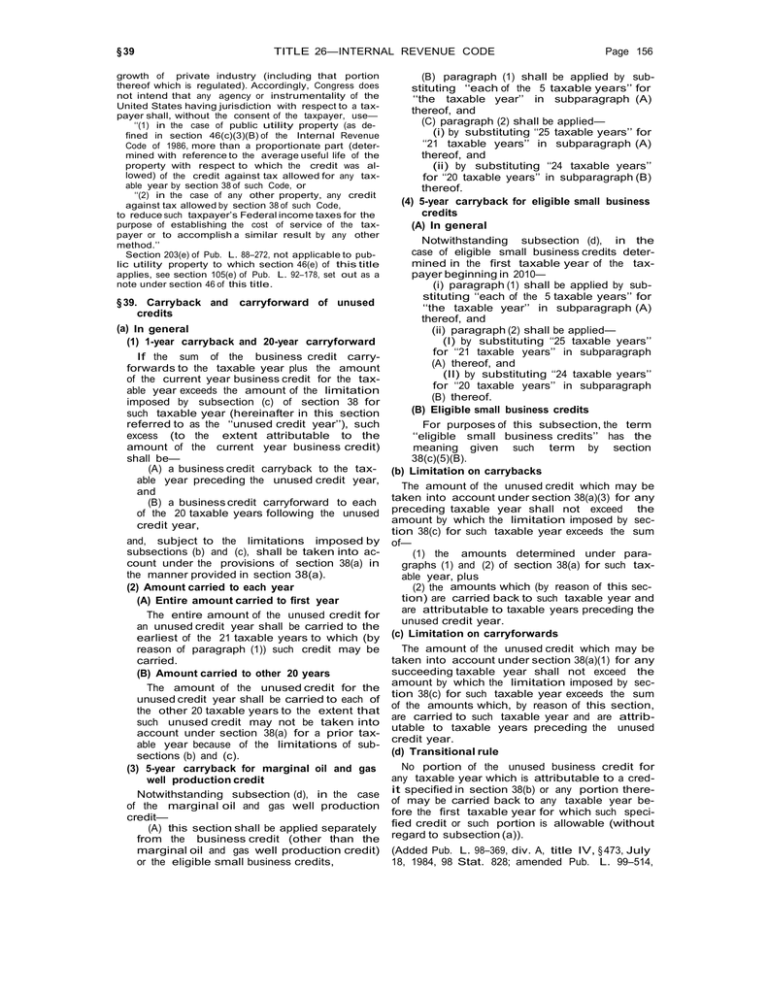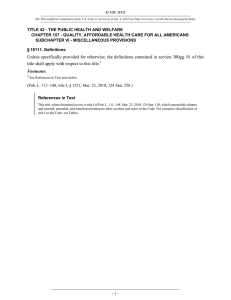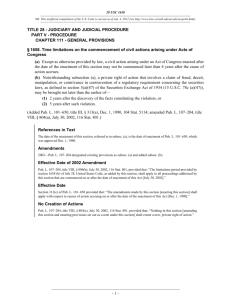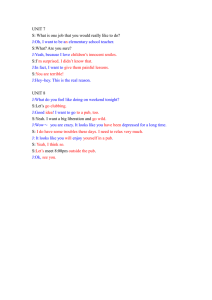Internal Revenue Code Section 39
advertisement

§ 39 TITLE 26—INTERNAL REVENUE CODE growth of private industry (including that portion thereof which is regulated). Accordingly, Congress does not intend that any agency or instrumentality of the United States having jurisdiction with respect to a taxpayer shall, without the consent of the taxpayer, use— ‘‘(1) in the case of public utility property (as defined in section 46(c)(3)(B) of the Internal Revenue Code of 1986, more than a proportionate part (determined with reference to the average useful life of the property with respect to which the credit was allowed) of the credit against tax allowed for any taxable year by section 38 of such Code, or ‘‘(2) in the case of any other property, any credit against tax allowed by section 38 of such Code, to reduce such taxpayer’s Federal income taxes for the purpose of establishing the cost of service of the taxpayer or to accomplish a similar result by any other method.’’ Section 203(e) of Pub. L. 88–272, not applicable to public utility property to which section 46(e) of this title applies, see section 105(e) of Pub. L. 92–178, set out as a note under section 46 of this title. § 39. Carryback and credits carryforward of unused (a) In general (1) 1-year carryback and 20-year carryforward If the sum of the business credit carryforwards to the taxable year plus the amount of the current year business credit for the taxable year exceeds the amount of the limitation imposed by subsection (c) of section 38 for such taxable year (hereinafter in this section referred to as the ‘‘unused credit year’’), such excess (to the extent attributable to the amount of the current year business credit) shall be— (A) a business credit carryback to the taxable year preceding the unused credit year, and (B) a business credit carryforward to each of the 20 taxable years following the unused credit year, and, subject to the limitations imposed by subsections (b) and (c), shall be taken into account under the provisions of section 38(a) in the manner provided in section 38(a). (2) Amount carried to each year (A) Entire amount carried to first year The entire amount of the unused credit for an unused credit year shall be carried to the earliest of the 21 taxable years to which (by reason of paragraph (1)) such credit may be carried. (B) Amount carried to other 20 years The amount of the unused credit for the unused credit year shall be carried to each of the other 20 taxable years to the extent that such unused credit may not be taken into account under section 38(a) for a prior taxable year because of the limitations of subsections (b) and (c). (3) 5-year carryback for marginal oil and gas well production credit Notwithstanding subsection (d), in the case of the marginal oil and gas well production credit— (A) this section shall be applied separately from the business credit (other than the marginal oil and gas well production credit) or the eligible small business credits, Page 156 (B) paragraph (1) shall be applied by substituting ‘‘each of the 5 taxable years’’ for ‘‘the taxable year’’ in subparagraph (A) thereof, and (C) paragraph (2) shall be applied— (i) by substituting ‘‘25 taxable years’’ for ‘‘21 taxable years’’ in subparagraph (A) thereof, and (ii) by substituting ‘‘24 taxable years’’ for ‘‘20 taxable years’’ in subparagraph (B) thereof. (4) 5-year carryback for eligible small business credits (A) In general Notwithstanding subsection (d), in the case of eligible small business credits determined in the first taxable year of the taxpayer beginning in 2010— (i) paragraph (1) shall be applied by substituting ‘‘each of the 5 taxable years’’ for ‘‘the taxable year’’ in subparagraph (A) thereof, and (ii) paragraph (2) shall be applied— (I) by substituting ‘‘25 taxable years’’ for ‘‘21 taxable years’’ in subparagraph (A) thereof, and (II) by substituting ‘‘24 taxable years’’ for ‘‘20 taxable years’’ in subparagraph (B) thereof. (B) Eligible small business credits For purposes of this subsection, the term ‘‘eligible small business credits’’ has the meaning given such term by section 38(c)(5)(B). (b) Limitation on carrybacks The amount of the unused credit which may be taken into account under section 38(a)(3) for any preceding taxable year shall not exceed the amount by which the limitation imposed by section 38(c) for such taxable year exceeds the sum of— (1) the amounts determined under paragraphs (1) and (2) of section 38(a) for such taxable year, plus (2) the amounts which (by reason of this section) are carried back to such taxable year and are attributable to taxable years preceding the unused credit year. (c) Limitation on carryforwards The amount of the unused credit which may be taken into account under section 38(a)(1) for any succeeding taxable year shall not exceed the amount by which the limitation imposed by section 38(c) for such taxable year exceeds the sum of the amounts which, by reason of this section, are carried to such taxable year and are attributable to taxable years preceding the unused credit year. (d) Transitional rule No portion of the unused business credit for any taxable year which is attributable to a credit specified in section 38(b) or any portion thereof may be carried back to any taxable year before the first taxable year for which such specified credit or such portion is allowable (without regard to subsection (a)). (Added Pub. L. 98–369, div. A, title IV, § 473, July 18, 1984, 98 Stat. 828; amended Pub. L. 99–514, Page 157 TITLE 26—INTERNAL REVENUE CODE title II, § 231(d)(3)(C)(i), title XVIII, § 1846, Oct. 22, 1986, 100 Stat. 2179, 2856; Pub. L. 100–647, title I, § 1002(l)(26), Nov. 10, 1988, 102 Stat. 3381; Pub. L. 101–508, title XI, §§ 11511(b)(2), 11611(b)(2), 11801(a)(2), Nov. 5, 1990, 104 Stat. 1388–485, 1388–503, 1388–520; Pub. L. 102–486, title XIX, § 1914(c), Oct. 24, 1992, 106 Stat. 3023; Pub. L. 103–66, title XIII, §§ 13302(a)(2), 13322(d), 13443(b)(2), Aug. 10, 1993, 107 Stat. 555, 563, 569; Pub. L. 104–188, title I, §§ 1205(c), 1703(n)(1), Aug. 20, 1996, 110 Stat. 1775, 1877; Pub. L. 105–34, title VII, § 701(b)(1), title X, § 1083(a), Aug. 5, 1997, 111 Stat. 869, 951; Pub. L. 105–206, title VI, § 6010(n), July 22, 1998, 112 Stat. 816; Pub. L. 106–554, § 1(a)(7) [title I, § 121(b)(2)], Dec. 21, 2000, 114 Stat. 2763, 2763A–610; Pub. L. 107–16, title VI, § 619(c)(1), June 7, 2001, 115 Stat. 110; Pub. L. 108–357, title II, § 245(b)(1), title III, § 341(c), Oct. 22, 2004, 118 Stat. 1447, 1487; Pub. L. 109–135, title IV, § 412(g), Dec. 21, 2005, 119 Stat. 2637; Pub. L. 111–240, title II, § 2012(a), (b), Sept. 27, 2010, 124 Stat. 2554.) PRIOR PROVISIONS A prior section 39 was renumbered section 34 of this title. Another prior section 39 was renumbered section 37 of this title. AMENDMENTS 2010—Subsec. (a)(3)(A). Pub. L. 111–240, § 2012(b), inserted ‘‘or the eligible small business credits’’ after ‘‘credit)’’. Subsec. (a)(4). Pub. L. 111–240, § 2012(a), added par. (4). 2005—Subsec. (a)(1)(A). Pub. L. 109–135, § 412(g)(1), substituted ‘‘the taxable year’’ for ‘‘each of the 1 taxable years’’. Subsec. (a)(3)(B). Pub. L. 109–135, § 412(g)(2), amended subpar. (B) generally. Prior to amendment, subpar. (B) read as follows: ‘‘paragraph (1) shall be applied by substituting ‘5 taxable years’ for ‘1 taxable years’ in subparagraph (A) thereof, and’’. 2004—Subsec. (a)(3). Pub. L. 108–357, § 341(c), added par. (3). Subsec. (d). Pub. L. 108–357, § 245(b)(1), amended heading and text of subsec. (d) generally, substituting provisions prohibiting carryback of the unused business credit attributable to a credit specified in section 38(b) for provisions prohibiting carryback of the enhanced oil recovery credit before 1991, sections 44, 45A, and 45B credits before their enactments, the renewable electricity production credit before its effective date, the empowerment zone employment credit, section 45C credit before July 1, 1996, DC Zone credits before their effective date, the new markets tax credit before Jan. 1, 2001, and the small employer pension plan startup cost credit before Jan. 1, 2002. 2001—Subsec. (d)(10). Pub. L. 107–16, § 619(c)(1), added par. (10). 2000—Subsec. (d)(9). Pub. L. 106–554 added par. (9). 1998—Subsec. (a)(2). Pub. L. 105–206 amended Pub. L. 105–34, § 1083(a)(2). See 1997 Amendment note below. 1997—Subsec. (a)(1). Pub. L. 105–34, § 1083(a)(1), substituted ‘‘1-year’’ for ‘‘3-year’’ and ‘‘20-year’’ for ‘‘15year’’ in heading, ‘‘1 taxable’’ for ‘‘3 taxable’’ in subpar. (A), and ‘‘20 taxable’’ for ‘‘15 taxable’’ in subpar. (B). Subsec. (a)(2). Pub. L. 105–34, § 1083(a)(2), as amended by Pub. L. 105–206, § 6010(n), in subpar. (A), substituted ‘‘21 taxable’’ for ‘‘18 taxable’’, and in subpar. (B), substituted ‘‘20 years’’ for ‘‘17 years’’ in heading and ‘‘20 taxable’’ for ‘‘17 taxable’’ in text. Subsec. (d)(8). Pub. L. 105–34, § 701(b)(1), added par. (8). 1996—Subsec. (d)(5). Pub. L. 104–188, § 1703(n)(1)(A), substituted ‘‘45A’’ for ‘‘45’’ in heading. Subsec. (d)(6). Pub. L. 104–188, § 1703(n)(1)(B), substituted ‘‘45B’’ for ‘‘45’’ in heading. Subsec. (d)(7). Pub. L. 104–188, § 1205(c), added par. (7). 1993—Subsec. (d)(4). Pub. L. 103–66, § 13302(a)(2), added par. (4). § 39 Subsec. (d)(5). Pub. L. 103–66, § 13322(d), added par. (5). Subsec. (d)(6). Pub. L. 103–66, § 13443(b)(2), added par. (6). 1992—Subsec. (d). Pub. L. 102–486 redesignated par. (5), relating to carryback of enhanced oil recovery credit, as (1), redesignated par. (5), relating to carryback of section 44 credit, as (2), and added par. (3). 1990—Subsec. (d)(1) to (4). Pub. L. 101–508, § 11801(a)(2), struck out par. (1) which related to carryforwards from an unused credit year which did not expire before first taxable year beginning after Dec. 31, 1983, par. (2) which related to carrybacks in determining amount allowable as credit including net tax liability, par. (3) which related to similar rules for research credit under section 30, and par. (4) which provided for no carryback of lowincome housing credit before 1987. Subsec. (d)(5). Pub. L. 101–508, § 11611(b)(2), added par. (5) relating to carryback of section 44 credit. Pub. L. 101–508, § 11511(b)(2), added par. (5) relating to carryback of enhanced oil recovery credit. 1988—Subsec. (d)(4). Pub. L. 100–647 added par. (4). 1986—Subsec. (d)(1)(A). Pub. L. 99–514, § 1846(1), inserted ‘‘(as in effect before the enactment of the Tax Reform Act of 1984)’’. Subsec. (d)(2)(B). Pub. L. 99–514, § 1846(2), substituted ‘‘as defined in section 26(b)’’ for ‘‘as so defined in section 25(b)’’. Subsec. (d)(3). Pub. L. 99–514, § 231(d)(3)(C)(i), added par. (3). EFFECTIVE D ATE OF 2010 AMENDMENT Pub. L. 111–240, title II, § 2012(c), Sept. 27, 2010, 124 Stat. 2554, provided that: ‘‘The amendments made by this section [amending this section] shall apply to credits determined in taxable years beginning after December 31, 2009.’’ EFFECTIVE D ATE OF 2004 AMENDMENT Pub. L. 108–357, title II, § 245(b)(2), Oct. 22, 2004, 118 Stat. 1448, provided that: ‘‘The amendment made by paragraph (1) [amending this section] shall apply with respect to taxable years ending after December 31, 2003.’’ Amendment by section 245(b) of Pub. L. 108–357 applicable to taxable years beginning after Dec. 31, 2004, see section 245(e) of Pub. L. 108–357, set out as a note under section 38 of this title. Amendment by section 341(c) of Pub. L. 108–357 applicable to production in taxable years beginning after Dec. 31, 2004, see section 341(e) of Pub. L. 108–357, set out as a note under section 38 of this title. EFFECTIVE D ATE OF 2001 AMENDMENT Amendment by Pub. L. 107–16 applicable to costs paid or incurred in taxable years beginning after Dec. 31, 2001, with respect to qualified employer plans first effective after such date, see section 619(d) of Pub. L. 107–16, as amended, set out as an Effective and Termination Dates of 2001 Amendment note under section 38 of this title. EFFECTIVE D ATE OF 2000 AMENDMENT Amendment by Pub. L. 106–554 applicable to investments made after Dec. 31, 2000, see § 1(a)(7) [title I, § 121(e)] of Pub. L. 106–554, set out as a note under section 38 of this title. EFFECTIVE D ATE OF 1998 AMENDMENT Amendment by Pub. L. 105–206 effective, except as otherwise provided, as if included in the provisions of the Taxpayer Relief Act of 1997, Pub. L. 105–34, to which such amendment relates, see section 6024 of Pub. L. 105–206, set out as a note under section 1 of this title. EFFECTIVE D ATE OF 1997 AMENDMENT Section 701(d) of Pub. L. 105–34 provided that: ‘‘Except as provided in subsection (c) [amending table of subchapters for this chapter], the amendments made by § 40 TITLE 26—INTERNAL REVENUE CODE this section [enacting subchapter W of this chapter and amending this section and section 1016 of this title] shall take effect on the date of the enactment of this Act [Aug. 5, 1997].’’ Section 1083(b) of Pub. L. 105–34 provided that: ‘‘The amendments made by this section [amending this section] shall apply to credits arising in taxable years beginning after December 31, 1997.’’ EFFECTIVE D ATE OF 1996 AMENDMENT Amendment by section 1205(c) of Pub. L. 104–188 applicable to amounts paid or incurred in taxable years ending after June 30, 1996, see section 1205(e) of Pub. L. 104–188, set out as a note under section 45K of this title. Section 1703(o) of Pub. L. 104–188 provided that: ‘‘Any amendment made by this section [amending this section and sections 40, 59, 108, 117, 135, 143, 163, 904, 956A, 958, 1017, 1044, 1201, 1245, 1297, 1394, 1397B, 1561, 4001, 6033, 6427, 6501, 6655, and 9502 of this title, renumbering section 6714 of this title as section 6715, and amending provisions set out as notes under sections 38, 42, 197, and 1258 of this title and section 401 of Title 42, The Public Health and Welfare] shall take effect as if included in the provision of the Revenue Reconciliation Act of 1993 [Pub. L. 103–66, title XIII, ch. I, §§ 13001–13444] to which such amendment relates.’’ EFFECTIVE D ATE OF 1993 AMENDMENT Amendment by section 13322(d) of Pub. L. 103–66 applicable to wages paid or incurred after Dec. 31, 1993, see section 13322(f) of Pub. L. 103–66, set out as a note under section 38 of this title. Amendment by section 13443(b)(2) of Pub. L. 103–66 applicable with respect to taxes paid after Dec. 31, 1993, with respect to services performed before, on, or after such date, see section 13443(d) of Pub. L. 103–66, as amended, set out as a note under section 38 of this title. EFFECTIVE D ATE OF 1992 AMENDMENT Amendment by Pub. L. 102–486 applicable to taxable years ending after Dec. 31, 1992, see section 1914(e) of Pub. L. 102–486, set out as a note under section 38 of this title. EFFECTIVE D ATE OF 1990 AMENDMENT Amendment by section 11511(b)(2) of Pub. L. 101–508 applicable to costs paid or incurred in taxable years beginning after Dec. 31, 1990, see section 11511(d)(1) of Pub. L. 101–508, set out as an Effective Date note under section 43 of this title. Amendment by section 11611(b)(2) of Pub. L. 101–508 applicable to expenditures paid or incurred after Nov. 5, 1990, see section 11611(e)(1) of Pub. L. 101–508, set out as a note under section 38 of this title. EFFECTIVE D ATE OF 1988 AMENDMENT Amendment by Pub. L. 100–647 effective, except as otherwise provided, as if included in the provision of the Tax Reform Act of 1986, Pub. L. 99–514, to which such amendment relates, see section 1019(a) of Pub. L. 100–647, set out as a note under section 1 of this title. EFFECTIVE D ATE OF 1986 AMENDMENT Amendment by section 231(d)(3)(C)(i) of Pub. L. 99–514 applicable to taxable years beginning after Dec. 31, 1985, see section 231(g) of Pub. L. 99–514, set out as a note under section 41 of this title. Amendment by section 1846 of Pub. L. 99–514 effective, except as otherwise provided, as if included in the provisions of the Tax Reform Act of 1984, Pub. L. 98–369, div. A, to which such amendment relates, see section 1881 of Pub. L. 99–514, set out as a note under section 48 of this title. E FFECTIVE DATE Section applicable to taxable years beginning after Dec. 31, 1983, and to carrybacks from such years, see Page 158 section 475(a) of Pub. L. 98–369, set out as an Effective Date of 1984 Amendment note under section 21 of this title. SAVINGS PROVISION For provisions that nothing in amendment by section 11801(a)(2) of Pub. L. 101–508 be construed to affect treatment of certain transactions occurring, property acquired, or items of income, loss, deduction, or credit taken into account prior to Nov. 5, 1990, for purposes of determining liability for tax for periods ending after Nov. 5, 1990, see section 11821(b) of Pub. L. 101–508, set out as a note under section 45K of this title. PLAN A MENDMENTS NOT REQUIRED UNTIL JANUARY 1, 1989 For provisions directing that if any amendments made by subtitle A or subtitle C of title XI [§§ 1101–1147 and 1171–1177] or title XVIII [§§ 1800–1899A] of Pub. L. 99–514 require an amendment to any plan, such plan amendment shall not be required to be made before the first plan year beginning on or after Jan. 1, 1989, see section 1140 of Pub. L. 99–514, as amended, set out as a note under section 401 of this title. § 40. Alcohol, etc., used as fuel (a) General rule For purposes of section 38, the alcohol fuels credit determined under this section for the taxable year is an amount equal to the sum of— (1) the alcohol mixture credit, (2) the alcohol credit, (3) in the case of an eligible small ethanol producer, the small ethanol producer credit, plus (4) the cellulosic biofuel producer credit. (b) Definition of alcohol mixture credit, alcohol credit, and small ethanol producer credit For purposes of this section, and except as provided in subsection (h)— (1) Alcohol mixture credit (A) In general The alcohol mixture credit of any taxpayer for any taxable year is 60 cents for each gallon of alcohol used by the taxpayer in the production of a qualified mixture. (B) Qualified mixture The term ‘‘qualified mixture’’ means a mixture of alcohol and gasoline or of alcohol and a special fuel which— (i) is sold by the taxpayer producing such mixture to any person for use as a fuel, or (ii) is used as a fuel by the taxpayer producing such mixture. (C) Sale or use must be in trade or business, etc. Alcohol used in the production of a qualified mixture shall be taken into account— (i) only if the sale or use described in subparagraph (B) is in a trade or business of the taxpayer, and (ii) for the taxable year in which such sale or use occurs. (D) Casual off-farm production not eligible No credit shall be allowed under this section with respect to any casual off-farm production of a qualified mixture. (2) Alcohol credit (A) In general The alcohol credit of any taxpayer for any taxable year is 60 cents for each gallon of al-




